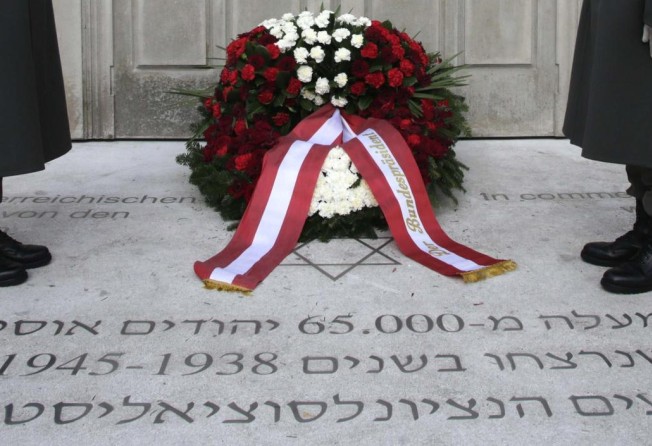
Germany and Austria mark 75th anniversary of Kristallnacht atrocities by Nazis against the Jews
Germany and Austria mark 75th anniversary of Kristallnacht atrocities by Nazis against the Jews

One afternoon, four-year-old John Izbicki woke from a nap to find the streets outside his Berlin home curiously quiet and empty.

The sense of liberation afforded him by what turned out to be an air raid drill was, he remembers, quite spectacular.
Less amused was his father, who rushed out of his haberdashery shop to scoop up his son and ask him if he was trying to get them arrested.
Three years later - and 75 years ago yesterday - Izbicki stood on the balcony of his home on Invalidenstrasse and watched as the massacre that would come to be known as Kristallnacht - The Night of Broken Glass - gathered its hateful momentum.
It was the morning after his eighth birthday and the mob beneath him had turned its attention to the Jewish-owned leatherware shop opposite.
Very soon its window, like thousands of others that day and night, had been smashed.
It was the assassination in Paris of a Nazi diplomat, Ernst vom Rath, allegedly by a young German-born Polish Jew, Herschel Grynszpan, that became the excuse for Kristallnacht.
The destructive orgy that ensued left at least 91 Jews murdered, 30,000 arrested and more than 7,000 Jewish businesses destroyed or damaged on 9 and 10 November 1938 in co-ordinated attacks in Germany and Austria.
Izbicki remembers that the violence seemed to particularly delight one old woman who limped past a Jewish-owned shop, screeching: "Dirty Jews! They should kill the lot of you!"
So shrill and so loud were her screams that they brought down a jagged piece of glass that had clung to the top of the window.
The falling shard split the old woman's head open. "There was blood everywhere and I vomited," he said. "When I'd finished vomiting, I believed in God."
Izbicki's newfound faith was put to the test hours later when a Hitler Youth marching band came to Invalidenstrasse and smashed the window of his parents' shop.
"I saw them picking up glass and throwing it through the broken window," said Izbicki.
"I knew that my parents were in there and I was terrified and I started screaming. And I screamed and screamed and screamed, so much so that it did something to my vocal cords, which I still have today."
Deidre Berger, director of the American Jewish Committee in Berlin, works to ensure Germans will never forget that night.
"It's important to understand why the veneer of civilisation was so easily cracked," she said.
She noted there were many who stood against "this mass orgy of violence". But there were more who joined in or stood by passively.
That, she said, has to be an enduring lesson of Kristallnacht.
Berlin Mayor Klaus Wowereit spoke about that lesson at a memorial event.
"Many neighbours remained indifferent, and I'm asking myself why over the years, so few came out and admitted, 'I saw it, and looked the other way. Today, I am ashamed,'" he wondered.
Rather than conducting one central memorial event, Germany is holding smaller commemorations, including striking art projects, Twitter initiatives and silent vigils.
Nechama Drober, a German Jew, doesn't need this weekend's events to recall the night when she looked out her bedroom window in Koenigsberg to see her synagogue in flames.
"Throughout my life, I could never forget what happened that night," she said. "It is good that Germany, my fatherland, remembers and commemorates what happened."
The Guardian, McClatchy-Tribune